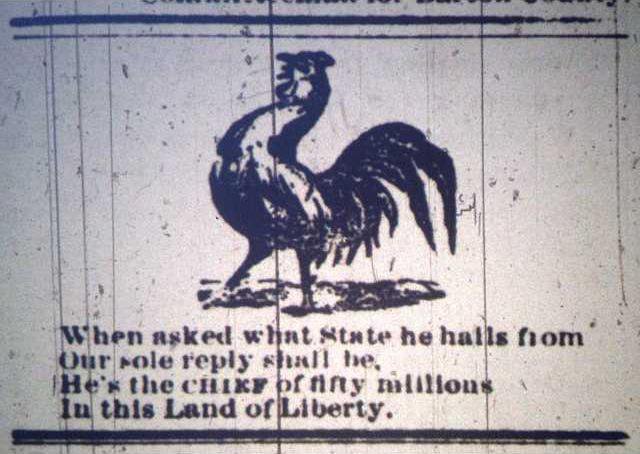Each week we’ll take a step back into the history of Great Bend through the eyes of reporters past. We’ll reacquaint you with what went into creating the Great Bend of today, and do our best to update you on what “the rest of the story” turned out to be.
On July 4, 1884, in ceremonies in Paris, France, the United States was presented the Statue of Liberty as a gift commemorating 100 years of American Independence. The project was conceived several years earlier. France would build the statue, and America would build the base. Money was tight on both sides of the Atlantic, but France did their part through fundraising efforts. The United States, however, was slower to bankroll the project. In fact, a year later, when the statue arrived in New York’s harbor, it had to remain in crates because there was no base constructed yet. Only the cornerstone was present, laid on Bedloe’s Island in the harbor on Aug. 5, 1884, according to the National Parks Service website. Thanks to the efforts of newspaperman Joseph Pulitzer, who shamed both the rich and middle class on the editorial pages of The New York World, money was finally raised for the base, and the statue was installed, dedicated on Oct. 28, 1886.
Singing society
Half a world away, settlers in Barton County marked Independence Day with very little pomp and circumstance according to the pages of both The Great Bend Register and The Inland Tribune.
The editor of the Register was traveling to Newton with his family that week, and sent back reports about the performances of the Concordia Musical Society of Great Bend.
“A number of German citizens of Harvey county are organizing a Local Singing Society at Newton. Last Saturday night they gave a ball at the Opera House, and supper about midnight. Four members of the Concordia Musical Society of Great Bend went down and attended the ball. During the evening they were called upon by the company present to ing, which they did several times and were loudly applauded and encored several times. The boys enjoyed themselves immensely and afforded their German neighbors a great deal of pleasure and enjoyment by their rendition of several choice pieces of music in the German language.”
Elsewhere in the paper, another story during the trip by train appears.
“We were on the same train last Saturday afternoon (en-route for Newton) with a tour of the Concordia Singing Club of this place. The boys sang two or three pieces on the train. The next day we were returning alone. A gentleman in the next seat to us (who was on the train Saturday) innocently asked us where we had left our troupe. I presume he took us for the business manager of a first class opera troupe or concert company.”
From the sounds of it, the Concordia Singing Club were the keepers of the fun that year. No public or private events were advertised to mark the patriotic day, save for one.
“The Concordia Singing Society of Great Bend will hold a Basket Pic Nic at Mehrhoff’s Grove on the 4th of July. We understand it is to be a strictly private affair and those who attend will be there by invitation.”
Three names for the same group is no mistake on the Tribune’s part. The uncertainty of the actual name of the group is in part why we were unable to turn up much information about this group. What we can say is that groups of this sort sprung up and evaporated as often as garage bands do today. But in that era, singing and performances by local musicians were the extent of musical resources for most people. And singing societies, usually closely associated with church choirs, also offered young people a social outlet. And with not much going on socially in Great Bend at the time, one has to wonder if the society didn’t have quite a few members.
Quiet
According to The Great Bend Register,
“Very little is said about the 4th of July. Nearly everybody is too busy to think about it. The Post Office will be closed as on Sunday’s and the P.M. (post master) will be mopping the perspiration from his brow, making reports, etc., while the Asst. P.M. will be away munching candy and gingerbread with his best girl.”
The Inland Tribune competed for the readership of Great Bend in 1884. Inside that paper, the only mention of Independence day was a single line in a single column on page 2.
“This is the glorious 4th.”
Hats off to the 4th
There was also an illustration and four-line poem, but that’s it. No massive section of retail advertisements.
But both papers did carry large ads for Mrs. Greenfield’s Millinery Goods, located on Maggie Street (which has since been renamed Lakin Street), just two doors down from the post office. She carried collars, fichus, ties, ruching and lovely laces of all kinds. Hers was also the store where ladies went for “Dr. Warner’s Health Corset,” which was later determined to be not so healthy, and other undergarments. She carried a full line of ribbons, feathers, velvets, laces, buttons and other dainty details.
In The Register, she was mentioned briefly on the local news page.
“Mrs. Greenfield has been quite sick this week. Her sickness is no doubt brought on by over exertion and rush of business at her immense millinery establishment.”
In context with the other entries, the sentiments were likely not sarcastically written. Perhaps the holiday was celebrated--with ladies sporting the latest in hats.
Out of the Morgue
A quiet 4th of July, 1884





